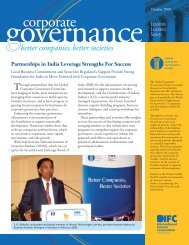SME Finance Policy Guide
SME Finance Policy Guide
SME Finance Policy Guide
Create successful ePaper yourself
Turn your PDF publications into a flip-book with our unique Google optimized e-Paper software.
G-20 <strong>SME</strong> FINANCE POLICY GUIDE<br />
61<br />
market contributed with 50,000 direct jobs and about<br />
200,000 indirect jobs in 2009. 66<br />
To address the problem of payment delays by government<br />
to <strong>SME</strong>s, and the possibility that delayed payments<br />
might lead to insolvencies, specific measures<br />
introduced by some OECD countries are:<br />
i) Legal moves to shorten payment delays and<br />
enforce payment discipline (France); and<br />
ii) Reduction of government payment delays<br />
(Australia, France, Hungary, Italy, the Netherlands,<br />
New Zealand, and United Kingdom).<br />
For example the U.K. government has cut payment<br />
delays to 10 days. Other governments are paying their<br />
<strong>SME</strong>s suppliers within 30 days or less, and the European<br />
Commission is revising the directive on payment<br />
delays in view of improving payment behavior. 67<br />
Challenges and Priorities for LDCs<br />
This approach can have particularly high impact where<br />
<strong>SME</strong>s are not well connected to supply chain finance,<br />
as is the case in many LDCs. Governments can use<br />
their role as buyers of goods and services from <strong>SME</strong>s to<br />
link those <strong>SME</strong>s to factoring, discounting, and contract-based<br />
financing. This in turn links <strong>SME</strong>s to financial<br />
services more broadly as an indirect result of<br />
improving their credit record.<br />
While some countries are already reforming the public<br />
procurement rules to provide a level playing field for <strong>SME</strong>s<br />
bidding for public contracts, 68 significant efforts may still<br />
be required to change public procurement practice and<br />
dismantle many barriers that discourage <strong>SME</strong>s from<br />
responding to tenders or even lead them to avoid such<br />
opportunities altogether. These include difficulties in<br />
obtaining information, lack of knowledge about tender<br />
procedures, the large size of the contracts, a short time span<br />
to prepare proposals and the cost of preparing them (since<br />
many costs are fixed, <strong>SME</strong>s face disproportionately high<br />
costs in comparison with larger enterprises), high administrative<br />
burdens, or unclear jargon used in tenders.<br />
C.3.5: <strong>SME</strong> CAPACITY, CREDITWORTHINESS<br />
<strong>SME</strong>s create jobs and income, contribute to poverty<br />
reduction, and help build a market-oriented economy.<br />
While <strong>SME</strong>s are a major source of employment and<br />
income for all countries, they are particularly important<br />
in developing economies, where <strong>SME</strong>s have the<br />
largest share of employment and job creation. 69<br />
<strong>SME</strong>s<br />
typically represent more than 90 percent of all firms<br />
outside the agricultural sector 70 and are responsible for<br />
more than 60 percent of employment and 60 percent<br />
of GDP in developing economies. 71<br />
The importance of <strong>SME</strong>s in developing markets contrasts<br />
with the multitude of constraints they face.<br />
Developing-economy <strong>SME</strong>s face an inter-related set of<br />
barriers that hamper their productivity growth, and<br />
thus their ability to contribute to economic and social<br />
development. Barriers to <strong>SME</strong> development fall into<br />
three general categories: business environment, knowhow,<br />
and finance. 72<br />
Problems in any one category tend<br />
to compound the obstacles in other areas. For example,<br />
limited managerial skills impede access to financial<br />
resources, and a poor business climate discourages<br />
<strong>SME</strong>s from investing in competitiveness.<br />
Research suggests that firms in emerging markets tend<br />
to have poorer management practices than those in<br />
66 According to the Chile Compra Strategic Plan 2010-2012.<br />
67 See The Impact of the Global Crisis on <strong>SME</strong> and Entrepreneurship Financing and <strong>Policy</strong> Responses. OECD 2009<br />
68 Such as the 2004 EU Directives reforming the public procurement rules<br />
69 Meghana Ayyagari, Asli Demirguc-Kunt and Vojislav Maksimovic, “Small vs. Young Firms across the World: Contribution to Employment,<br />
Job Creation, and Growth,” The World Bank Development Research Group (April 2011): 4.<br />
70 “Promoting <strong>SME</strong>s for Development: The Enabling Environment and Trade and Investment Capacity Building,” DAC Journal, Vol. 5, No. 2<br />
(2004): 29.<br />
71 “Why Support <strong>SME</strong>s?” International <strong>Finance</strong> Corporation, World Bank Group (2010): 3.<br />
72 Michael Klein, “Promoting Small and Medium Enterprises: Their Importance and the Role of Development <strong>Finance</strong> Institutions in<br />
Supporting Them,” The Atrium Dialogues, DEG KfW Bankengruppe (November 2010): 12-13.




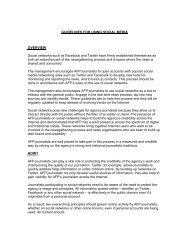

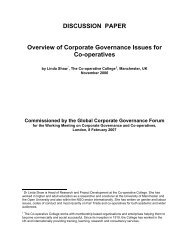
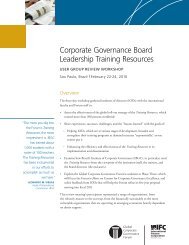




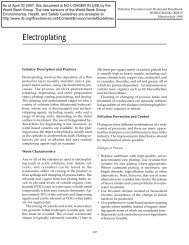

![Print a two-page fact sheet on this project [PDF] - IFC](https://img.yumpu.com/43449799/1/190x245/print-a-two-page-fact-sheet-on-this-project-pdf-ifc.jpg?quality=85)

